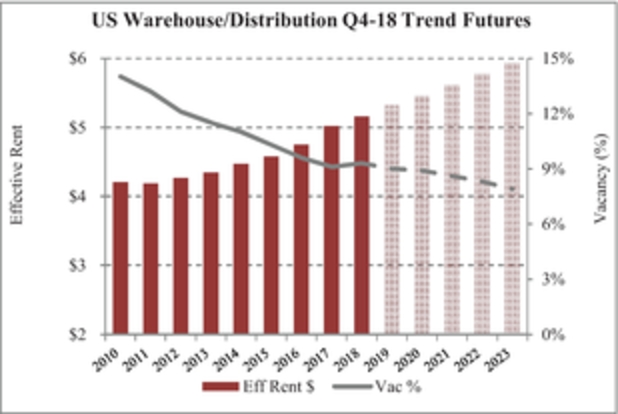| • | occupancy rates and rents of a completed project may not be sufficient to make the project profitable; |
| • | our ability to dispose of properties developed or redeveloped with the intent to sell could be impacted by the ability of prospective buyers to obtain financing given the current state of the credit markets; and |
| • | the availability and pricing of financing to fund our development activities on favorable terms or at all. |
These risks could result in substantial unanticipated delays or expenses and, under certain circumstances, could prevent completion of development or redevelopment activities once undertaken, any of which could have an adverse effect on our financial condition, results of operations, cash flows and our ability to pay distributions on, and the per share trading price of, our stock.
Our success depends on key personnel whose continued service is not guaranteed, and the departure of one or more of our key personnel could adversely affect our ability to manage our business and to implement our growth strategies, or could create a negative perception in the capital markets.
Our continued success and our ability to manage anticipated future growth depend, in large part, upon the efforts of key personnel, particularly Mr. Jeffrey E. Witherell, our Chief Executive Officer, and Mr. Pendleton P. White, our President and Chief Investment Officer, who have extensive market knowledge and relationships and exercise substantial influence over our operational, financing, acquisition and disposition activity.
Our ability to retain our senior management, particularly Messrs. Witherell and White, or to attract suitable replacements should any member of our senior management leave, is dependent on the competitive nature of the employment market. We have not obtained and do not expect to obtain key man life insurance on any of our key personnel. The loss of services of one or more members of our senior management team, or our inability to attract and retain highly qualified personnel, could adversely affect our business, diminish our investment opportunities and weaken our relationships with lenders, business partners, existing and prospective tenants and industry participants. Further, the loss of a member of our senior management team could be negatively perceived in the capital markets. Any of these developments could adversely affect our financial condition, results of operations, cash flows and our ability to pay distributions on, and the value of, our stock.
Potential losses, including from adverse weather conditions and natural disasters, may not be covered by insurance.
We carry commercial property, liability and terrorism coverage on all the properties in our portfolio under a blanket insurance policy, in addition to other coverages that may be appropriate for certain of our properties. We will select policy specifications and insured limits that we believe to be appropriate and adequate given the relative risk of loss, the cost of the coverage and industry practice. Some of our policies will be insured subject to limitations involving large deductibles or co-payments and policy limits that may not be sufficient to cover losses, which could affect certain of our properties that are located in areas particularly susceptible to natural disasters. In addition, we may discontinue terrorism or other insurance on some or all of our properties in the future if the cost of premiums for any such policies exceeds, in our judgment, the value of the coverage discounted for the risk of loss. We do not carry insurance for certain types of extraordinary losses, such as loss from riots, war, earthquakes and wildfires because such coverage may not be available or is cost prohibitive or available at a disproportionately high cost. As a result, we may incur significant costs in the event of loss from riots, war, earthquakes, wildfires and other uninsured losses.
If we or one or more of our tenants experiences a loss that is uninsured or that exceeds policy limits, we could lose the capital invested in the damaged properties as well as the anticipated future cash flows from those properties. In addition, if the damaged properties are subject to recourse indebtedness, we would continue to be liable for the indebtedness, even if these properties were irreparably damaged. Furthermore, we may not be able to obtain adequate insurance coverage at reasonable costs in the future as the costs associated with property and casualty renewals may be higher than anticipated.
We may not be able to rebuild our portfolio to its existing specifications if we experience a substantial or comprehensive loss of such properties.
In the event that we experience a substantial or comprehensive loss of one of our properties, we may not be able to rebuild such property to its existing specifications. Further, reconstruction or improvement of such a property would likely require significant upgrades to meet zoning and building code requirements. Environmental and legal restrictions could also restrict the rebuilding of our properties.


